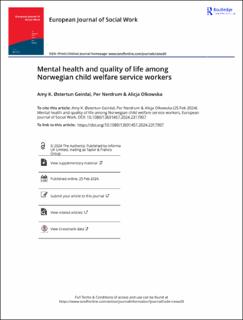Mental health and quality of life among Norwegian child welfare service workers
Peer reviewed, Journal article
Published version
Permanent lenke
https://hdl.handle.net/11250/3124562Utgivelsesdato
2024Metadata
Vis full innførselSamlinger
Originalversjon
10.1080/13691457.2024.2317907Sammendrag
Social workers in child welfare services play an important role in preventing crises and identifying the need for and implementing relevant measures among children and families of different ages and circumstances, often with little recognition. The main aim of this study was to examine mental health and overall- and professional quality of life of 978 Norwegian child welfare (CW) service workers. The design was cross-sectional and quantitative analyses showed that several demographic and job-related factors were associated with poorer mental health and quality of life. Approximately half of the respondents showed levels of psychological distress that warranted professional support and moderate or high levels of burnout and secondary stress (professional quality of life). Professional quality of life explained most of the variance in psychological distress and overall quality of life, respectively, after controlling for demographic and job-related variables. The findings of this study can lay the foundation for preventing mental health and quality of life issues among CW workers, as it indicates the focus areas for schools of social work in terms of the mental health of students and future CW workers.

